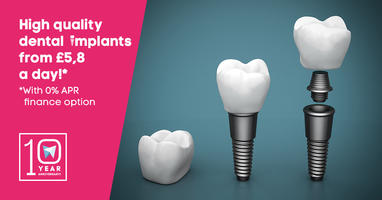With several hundreds of different types of dental implants on the market, it can get confusing to figure out which one may be the best for you. There are ones with different lengths and widths, not to mention tapering or threading, there are some that can be instantly loaded and put into use while others need time to integrate into the bone, and a myriad of other choices that can confuse the patient intensely. I am going to try to disambiguate just one of these issues, one that has been receiving a lot of attention as of late - implant surfaces. Do know that this article is no substitute for a consultation with your dentist, and when you make decisions about your health without the expert advice of a trained medical professional you are taking a risk. With that being said, I hope this article helps clear up some of the haze around this potentially important issue.
Dental implants can be coated with a variety of things and for a variety of reasons. Usually implants are coated to ensure osseo-integration. Osseointegration is the process by which the dental implant becomes integrated into the jawbone, literally fuses with the bone. There are some coatings, like Ca45, which integrate more readily into bone than titanium alone. Sometimes, an extra coating of titanium is applied to make sure that the dental implant fits better into the socket. Sometimes the surface is coated with nanoparticles, also with the aim of quicker recovery. In the beginning of the life of this technology, only titanium plasma and a substance called HA were used to coat implants. It was believed that as titanium plasma spray made the implant bigger, but also the surface area softer, as plasma is softer than hard titanium. It turns out that since more pressure is applied with bigger volume, if the dentist is not careful he could cause necrosis of the bone tissue. Nowadays there are materials that release Calcium ions that literally help bone growth, so a lot has changed.
Whether an implant is coated or is surface treated is also an important distinction. Nowadays, the trend is moving away from coating the implant with materials, and more towards treating the surface in a way to accelerate bone development or integration. There are porous surfaces that allow bone to growth through the actual implant, which leads to marvelous initial stability and is arguably the best solution for a single implant. However this takes time, and these implants can never be loaded immediately, so these are not a quick fix. You also hear about acid treated dental implants. These also have a rough edge, because of micro corrosion, but do not have an edge so rough that you can actually feel it, but integration is much quicker. A smooth surface is unnatural to the body, and is attacked by our immune system much more vigorously, but an edge that can be grown into is much more likely to be integrated quickly.
The last thing to take into account is the natural bone. Different methods work better for different kinds of bone. Harder bones for instance have much less cell migration, so surface treated dental implants may just be a waste of money, as their osseointegrating qualities may not even be used at all. Cells do migrate in hard bone matter, but not that much. So if the implant is firmly planted in the softer bone tissue of the alveolar bone, than a coated implant is unnecessary. However, if alveolar tissue is weak,or if your bone material is not very dense or is in poor condition, it is very much indeed recommended that you get a coated or surface treated dental implant.
So for the usual suspects, the coating is not an issue, and non coated implants are the norm. Surface treated ones can do no harm, but can be more expensive to little avail if the alveolar tissue is strong and the bone is sufficiently dense.
image: 1.

